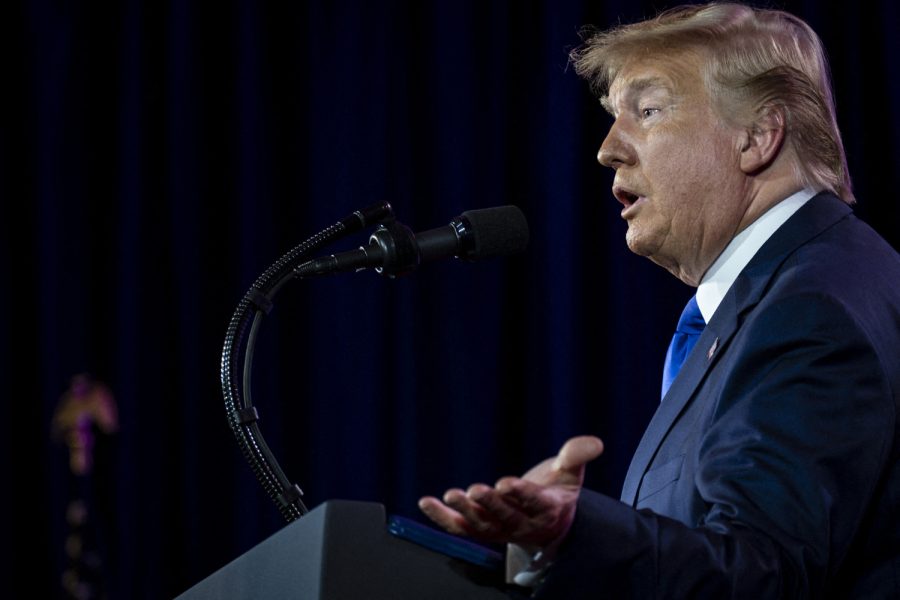Editorial: The free press is not the enemy of the people
It is up to all Americans to end the escalation of threats against journalists, beginning with President Trump.
U.S. President Donald J. Trump delivers remarks at the Values Voter Summit at the Omni Shoreham Hotel on Saturday, Oct. 12, 2019 in Washington, D.C.
October 14, 2019
There’s an abundance of public discourse about freedom in the U.S. Freedom of speech and religion are hotly debated throughout our society, from the classrooms to the courthouses. Both of these fundamental rights have their genesis in the First Amendment. Among other constitutional guarantees found in the Bill of Rights is the freedom of the press.
The work of journalists has been a cornerstone of our democracy, from the muckrakers exposing unjust manufacturing conditions at the turn of the 20th Century to the publication of the Pentagon Papers revealing government disinformation during the 1970s.
There have always been detractors of the Fourth Estate. Criticism is a part of healthy relationships and societies. However, recent escalations in hostility toward journalists are exceedingly frightening, especially considering that a leading voice in the anti-free press movement is the president.
This escalation is evident in a video that was played at President Trump’s Miami resort as part of a three-day event for the president’s supporters last week. As reported by the New York Times Sunday, the video depicts Trump graphically assaulting and murdering people with logos of news organizations superimposed on their faces — including the Times, the Washington Post, and generic labels of “fake news”— and similarly edited political opponents — including former President Barack Obama and Republican Sens. Mitt Romney of Utah and the late John McCain of Arizona.
The president did not attend the event where the video was shown but close allies including his son, Donald Trump Jr., and former White House Press Secretary Sarah Huckabee Sanders did. Current White House Press Secretary Stephanie Grisham tweeted Monday that the president had not seen the video, “but based on everything he has heard, he strongly condemns the video.”
Trump himself has not spoken on the issue, but his tweets Monday included more raucous criticisms of the media. He called the Times “corrupt,” and he used the word “greasy” describe the “fake news.”
This is not the first time Trump has been involved invocations of violence against members of the media. On July 2, 2017, he tweeted a video that depicts him tackling and striking a person marked with the CNN logo in a similar fashion to the Sunday video. The tweet included “#FraudNewsCNN.”
If that were the extent of it, perhaps there would not be much of a problem, but that is not the case. This issue is much broader than just a few provocatively manipulated clips of the president physically attacking journalists.
Trump has made a habit of lambasting journalists and news organizations he does not like as the “enemy of the people.” He speaks this way at events covered by the press, directing his displeasure at media pools and briefing rooms full of reporters.
It appears that any coverage that does praise his policies is “fake news” in the eyes of the president. He has gone so far as to suggest broadcasters such as NBC should have their licenses revoked, calling them “bad for the country.”
As disturbing as these videos are to watch as journalists and American citizens, it’s more than personal threats to journalists’ safety.
By calling into question the fairness and ethical standards of any media coverage that portrays Trump poorly, the president can claim all criticism of him is unfair and unethical.
The president is not only going after the press. He’s going after anyone who dares defy him. By chipping away at the cornerstone of democracy, the entire structure begins to crumble.
It is up to the American people to not fall into rhetorical patterns similar to that of the president. It is up to the president to discontinue his debased vitriol of members of the free press. It is up to the free press to persevere with the work that is guaranteed in the First Amendment.
Editorials reflect the majority opinion of the DI Editorial Board and not the opinion of the Publisher, Student Publications Inc., or the University of Iowa.
Editorial board members are Marissa Payne, Brooklyn Draisey, Elijah Helton, and Taylor Newby.



